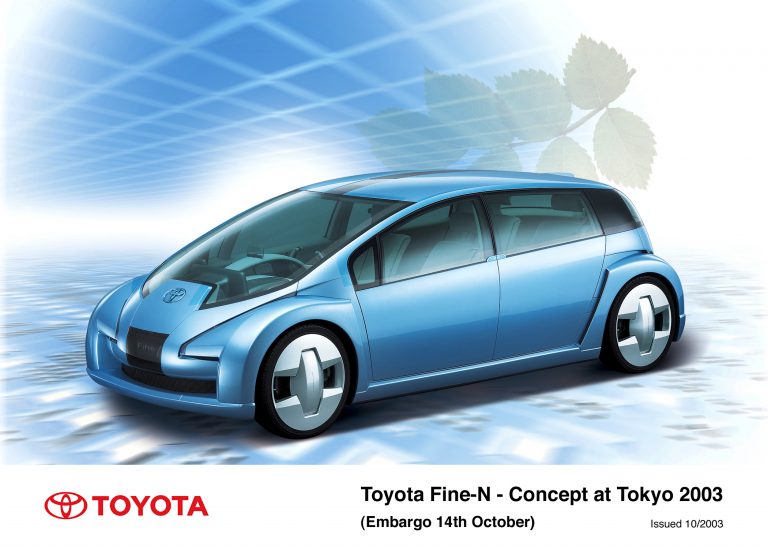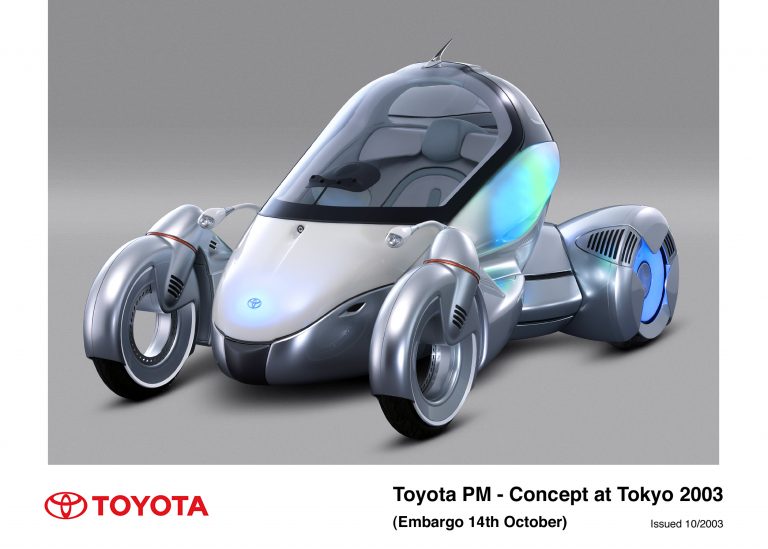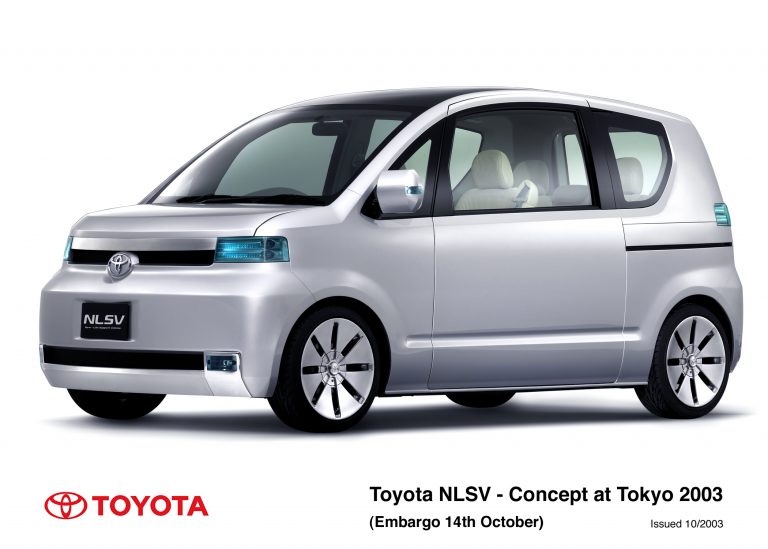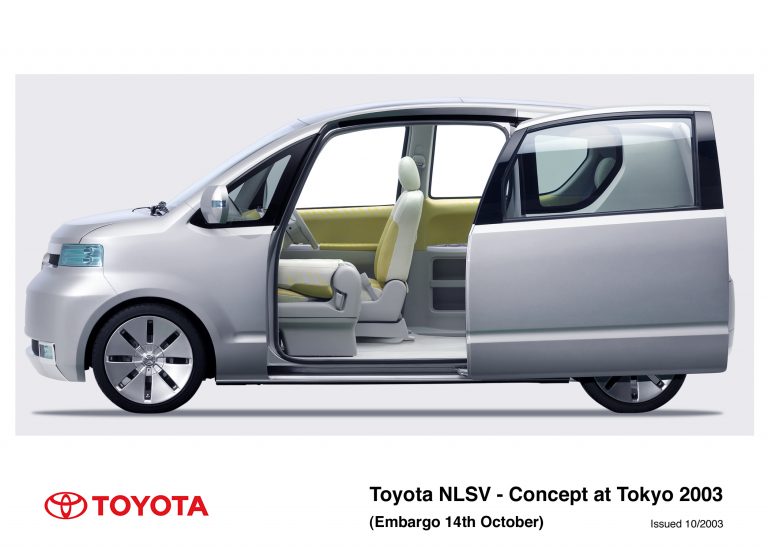Toyota To Present Future Concepts At Tokyo Motor Show
Key points
- Toyota embraces theme of “Eco and Emotion” at Tokyo Motor Show 2003
- New concept cars showcase advanced environmental performance and driving dynamics
- Fine-N (Fuel cell INnovative Emotion-Next generation) demonstrates new design freedom in fuel cell vehicles with ultra-slim underfloor fuel stack and by-wire drive functions
- PM (Personal Mobility) vehicle extends vehicle-to-vehicle communications to allow cars to talk to each other, share information and move in groups
- NLSV (New-Life Support Vehicle) focuses on ease of use and adaptability with low flat floor, high ceiling and extra-large electric sliding doors
- CS&S 2+2 hybrid power roadster
Toyota will be using the Tokyo Motor Show to demonstrate how advanced technology to protect the environment no longer needs to compromise driving performance. Recognising that cars should still be fun to drive, it will be showing a series of new concept vehicles that address the demands of motorists both today and in the near future, combining advances in emissions-free power systems with improved vehicle dynamics. Practicality, versatility, style and advanced engineering all feature in a series of new cars that push Toyota’s automotive creativity further into the 21st century.
Fine-N: A NEW ERA OF DESIGN FREEDOM
The Fine-N (Fuel cell INnovative Emotion-Next generation) shows how latest generation fuel cell technology opens up a new world of design possibilities. The hydrogen fuel stack is just 150mm tall and is housed in the floor of the car, along with the lithium ion battery. The smaller dimensions of the fuel cell have been achieved partly by storing the compressed hydrogen under greater pressure (70mpa or about 700 atmospheres).
Instead of a conventional drivetrain, the Fine-N uses by-wire steering, braking and throttle controls. With no mechanical constraints, the steering wheel and pedals can be positioned to suit the preferences of any driver and the interior has been opened up completely for the occupants. In fact the Fine-N has cabin space greater than that of a Camry, contained within a body that is about the size of a Corolla. The exterior is characterised by the wheel-at-each corner design with short overhangs and a panoramic front screen. Pronounced front and rear wings add character to the dynamic design.
Each wheel is equipped with its own 25kW motor, providing exceptional performance through four-wheel control for acceleration and braking. Thanks to the efficiency of the new fuel cell, the driving range is up to 500km (312.5 miles).
The Fine-N is protected by a face recognition system that authenticates the driver before unlocking automatically. Fastening the seatbelt then triggers the driver’s personal memory settings for steering wheel and pedal positions and ventilation, air conditioning, navigation and audio settings.
PM: THE CAR THAT LOVES TO SOCIALISE
The PM (Personal Mobility) is a one-person vehicle that takes the personalisation of the motor car to new levels. The driver sits inside a pod-like cabin that is equipped with twin pistol grip controls for by-wire steering, braking and acceleration. Power is from a rear-mounted brushless electric motor.
A visual communication system keeps the car in touch with other PMs so the vehicles can share information and “chat” about experiences. The PMs are social machines and can move in groups (platooning), one taking the lead and the others following at safe intervals on auto pilot. Only the car in front needs to have the destination programmed into its navigation system.
The PM also communicates different emotions, using LEDs to display different colours on its body panels, lights and rear wheels. The angle of the cabin and length of wheelbase adjust according to driving conditions, standing tall for walk-in access, dropping slightly for urban driving and fully extending for high-speed motoring. Manoeuvrability is aided by rear wheels that turn in opposite directions, enabling the car to rotate on the spot. The front wheels feature independent steering and a new hollow centre design.
NLSV: ACCESS ALL AREAS
Convenience and adaptability are the hallmarks of the NLSV (New-Life Support Vehicle), a car that addresses real-life needs through clever design and engineering. The two-box design features large, single electric sliding doors on each side, allowing easy access to both front and rear seats. The floor is set low, so there is not the high step into the vehicle typical of current MPVs. Inside, the floor is completely flat and the ceiling is high, giving the NLSV a walk-through facility. So generous are the cabin proportions, it’s possible for a passenger to raise an umbrella before stepping out into the rain.
The seats can be adjusted to create a range of different in-car environments that address different leisure or lifestyle demands. The cargo area can be extended to make room for a bicycle on board, too.
CS&S: THE WORLD’S FIRST HYBRID POWER SPORTS CAR
The CS&S had its world premiere at the Frankfurt Motor Show and will move on to join Toyota’s line-up of concept cars at Tokyo. A 2+2 roadster, it is the world’s first hybrid power sports car, using a combination of a 1.5-litre petrol engine driving the rear wheels and an electric motor powering the front wheels.
As well as offering lower exhaust emissions and excellent fuel economy, the CS&S also demonstrates the performance capabilities of Toyota’s Hybrid Synergy Drive. The system is similar to that used in the new Toyota Prius, but with a more powerful electric motor, making the car even less reliant on its petrol engine.
The CS&S also marks the first application of Toyota Space Touch, which presents controls for audio, navigation and email systems as holographic projections that appear to float in front of the driver.
ENDS






